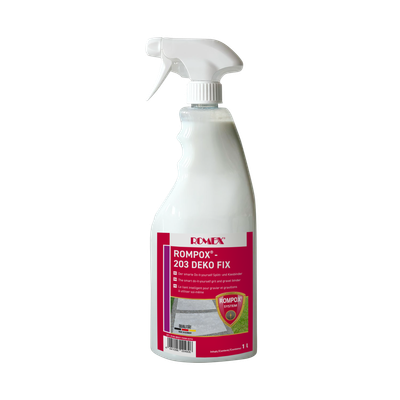Grit and gravel binders
High-quality systems | Firm to walk on | Water-permeable | Wide range of applications
The decorative solution for walkways, driveways and tree grates
Our grit and gravel binders offer effective solutions for creating attractive and durable surfaces, ideal for garden paths, parks and other outdoor areas. These systems are particularly permeable to water, providing excellent drainage and simplifying maintenance. They are ideal for places that need to be barrier-free and accessible to all, such as public parks and walkways.
In addition, our grit and gravel binders are a cost-effective and environmentally friendly choice for tree surrounds, allowing optimal water absorption for the roots while keeping the surrounding area clean. They reduce material and maintenance costs compared to traditional tree grates and are easy to work with.
Our synthetic resin binders such as ROMPOX® - 201 DEKO UV and ROMPOX® - 202 DEKO EP are perfect for the design of car parking spaces, private driveways and tree grates. They bind grit and gravel securely and create fixed walkable, attractive and easy-to-clean surfaces that are suitable for both light and dark stone types.
Our high-quality grit and gravel binders

ROMPOX® - 201 DEKO UV
Der hochmoderne, UV-stabile Splitt- und Kiesbinder für alle Anwendungsbereiche
Go to Product


Calculate your direct needs
Consumption calculator
How much ROMEX® grit and gravel binder do I need for my surfaces? And how much grit and gravel is required? Our consumption calculator will answer these questions in no time at all. With just a few clicks, you can easily calculate your specific requirements. This saves you time and money.

Setup recommendation
Light use
Even for surfaces that are exposed to light loads, a solid structure is important. Lightly loaded surfaces include splash guards around the house, flowerbeds, garden paths or as joints between slabs. On an unbound, settlement-free gravel base course, the layer thickness must be at least 3 cm. On a water-permeable, bound bedding, the layer must be at least 2 cm thick, depending on the grain size. You should choose a grit/gravel with a grain size that is not too large. Optimum grain size is 8-11 mm. Sealing is optional, but should be carried out regularly every two to three years to ensure a permanently stable surface.
Our recommendation:
Laying on a compacted gravel base.
Grit/gravel: grain size 2-5 mm to 8-11 mm
Binder: ROMPOX® - 201 DEKO UV or ROMPOX® - 202 DEKO EP

Setup recommendation
Heavy use
To ensure a stable grit/gravel surface that will last, it is important to choose the right construction, especially when it is subject to heavy use. This is the case, for example, in driveways and car parks, as well as on public footpaths and tree surrounds. On an unbound, settlement-free gravel base layer, the layer thickness must be at least 5 cm. On a water-permeable, bound bedding, the layer must be at least 3 cm thick. It is also important to choose a grit/gravel with a small grain size and to seal the surface immediately after it has hardened.
Our recommendation:
Laying on a bonded bed.
Bedding: ROMPOX® - 303 CEM-TB, Trass-Bed Compound
Grit/gravel: grain size 1-3 mm to 2-5 mm
Gravel binder: ROMPOX® - 201 DEKO UV or ROMPOX® - 202 DEKO EP
Sealing: 200-300 g/m² with the same gravel binder
Application range of our gravel binders
Walkways
Private driveways
Tree pits/surrounds
Border strip
Large joints
Decorative squares
rass pavers
Parks
Decorative outdoor areas
Technical information
Washing grit/gravel
In general, all grit and gravel must be washed and dried before use to avoid loss of strength. Grit and gravel must be dry when mixing, as an increased moisture content significantly accelerates the curing process. Relative humidity also accelerates the curing process.
For 2-component systems, the resin and hardener should first be mixed in a clean container for 2 minutes before mixing with the grit/gravel.
Sealing
For even better surface strength, the surface should be sealed immediately after hardening with the same binder system, using a fur roller. This process should be repeated every three years on average.
There is a general risk of slipping on polishedand/or round gravel. To counteract this, sprinkle the surface with fine corundum or mix corundum into the sealant.
Cleaning and maintenance
It is generally recommended to lay a fleece under the grit/gravel surface to prevent weeds from growing from the ground. Since airborne seeds and grasses can settle on the surface and find a hold there to grow, surfaces should be cleaned regularly.
Um eine über Jahre hinweg eine dauerhaft feste, stabile Oberfläche zu haben, sollte die Oberfläche durchschnittlich alle drei Jahre neu versiegelt werde.
Expansion joints in the bonded construction method
Expansion joints, particularly on adjacent structures, protruding components and fixtures, are essential for absorbing stresses in the bonded surface. These stresses arise from various factors and can lead to cracks and damage in the surface. Sufficient expansion joints must be planned in accordance with the regulations and building physics principles. Expansion joints from the substructure must be taken over. Protruding components and fixtures must be provided with an edge insulation strip.